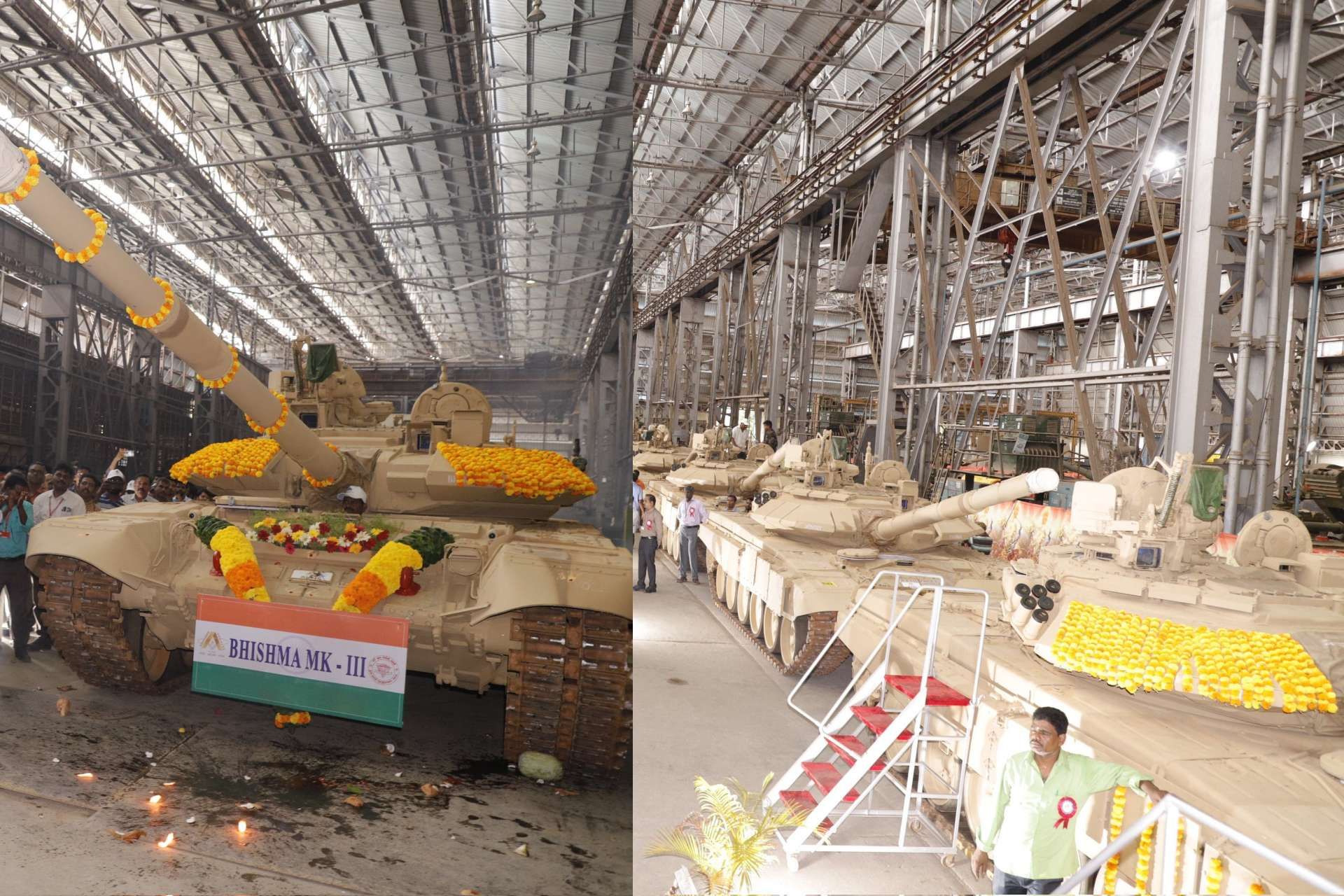Breaking News
India Receives First Batch of Upgraded T-90 Bhishma Mk-3 Tanks.
The Indian Army has taken delivery of the first batch of upgraded T-90 Bhishma Mk-3 main battle tanks (MBTs). This initial delivery, comprising 10 T-90MS tanks, marks the beginning of a phased series of deliveries that will add a total of 464 units to the Army's arsenal over the next five years.
Follow Army Recognition on Google News at this link

The production of the T-90 Bhishma Mk-3 is part of a contract signed in 2019 to deliver 464 tanks, with the first delivery of 10 units. (Picture source: Indian press)
The production of the T-90 Bhishma Mk-3 is part of a contract signed in 2019 to deliver 464 tanks, with the first delivery of 10 units. The remaining tanks will be delivered in phases over five years, and the existing T-90S tanks of the Indian Army will be upgraded to T-90MS standards, ensuring a modernized and uniform fleet.
The T-90 Bhishma Mk-3, known for its impressive firepower and advanced armor protection, represents a notable enhancement of the Indian Army's combat capabilities. The Mk-3 version integrates state-of-the-art upgrades, including advanced targeting systems, improved survivability features, and enhanced mobility.
A significant feature of the T-90 Bhishma Mk-3 is its high degree of indigenization. The tank boasts an indigenous content of 83%, with a 100% indigenous production for its engine. This high level of indigenization reflects India's commitment to reducing dependency on foreign defense imports and strengthening self-reliance in military technology.
The T-90 Bhishma Mk-3 is powered by a V12 diesel engine developing 1,130 horsepower, allowing it to reach a maximum speed of 60 km/h and a range of 550 km. Weighing 50.7 tons, the tank is designed to be both robust and fast on the battlefield.
The armament of the T-90 Bhishma Mk-3 includes a 125 mm 2A46M-5 main gun with an automatic loader, a coaxial 7.62 mm machine gun, and an optional remotely controlled 7.62 mm anti-aircraft machine gun. It can carry 42 rounds of 125 mm ammunition and 3,000 rounds of 7.62 mm ammunition, with 12 smoke grenade launchers on the turret for concealment maneuvers.
The tank is equipped with a thermal sighting system developed by DRDO and Bharat Electronics Limited, capable of detecting targets up to 8 km away, day or night, along with a laser rangefinder with a range of up to 5 km. The fire control system integrates a digital ballistic computer, improving accuracy by accounting for various environmental conditions. An automatic target tracking system allows for quicker and more precise target acquisition and tracking.
The T-90 Bhishma Mk-3 uses Kontakt-5 explosive reactive armor (ERA) for protection and survivability, providing enhanced protection against projectiles and anti-tank missiles. It is also equipped with Saab's LEDS-150 active protection system (APS), increasing survivability against modern threats. Additionally, it has protections against chemical, biological, radiological, and nuclear (CBRN) threats.
The integration of the T-90 Bhishma Mk-3 significantly enhances the Indian Army's capabilities, offering better mobility, superior firepower, and increased protection. These improvements will enable the Army to better respond to modern threats and maintain a strong defensive posture in the region.
The Heavy Vehicles Factory (HVF) in Avadi is responsible for the assembly and modernization of these tanks. Alongside the delivery of new tanks, HVF is also tasked with upgrading the existing T-90S fleet to T-90MS standards, ensuring the Indian armored corps remains at the cutting edge of military technology.
The arrival of the first 10 T-90MS tanks reflects India's ongoing efforts to modernize its military forces and strengthen its defense manufacturing capabilities. As the rest of the order is fulfilled and the existing fleet is upgraded, the T-90 Bhishma Mk-3 will play a central role in bolstering national defense preparedness.
The induction of the T-90 Bhishma Mk-3 marks a new chapter in India's defense journey, showcasing the nation's progress towards self-reliance and technological superiority in its military assets.


























